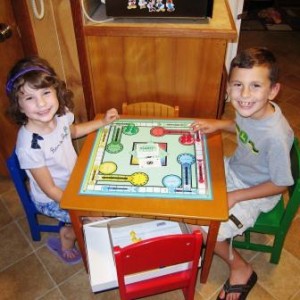With so many electronic distractions these days, from smart phones to game systems to television and more, it’s no wonder the notion of ‘family game night’ conjures up images of a black and white 50’s family happily spending their after-dinner time around a Monopoly board, laughing and bonding and generally enjoying each other’s company. Board games? Like the neighborhoods where folks didn’t need to lock their doors at night, we don’t do that anymore.

How they managed to sort the orange properties from the green ones with no color is beyond me, but nevertheless, we imagine they must have had lots of fun back then.
These days, games are a generally one-person affair, between a kid and his DS. No parents needed or wanted. While parents who value their ‘quiet time’ might see this as a good thing, especially if they have difficulty disciplining their child during their ‘non-DS’ time (like when they wake up in the morning, during meals, and right before bed…), we think that games aren’t so much about the games themselves, but the learning experiences they create. (Please don’t get the wrong idea – we believe the right electronic games are fine and even can be useful and educational in moderation, but, like so many things, they can go too far.)
As anyone who knows us or reads this blog regularly knows, our kids are small (7, 5, 4, 2). Right now, when they want to break out the Sorry, Connect 4, Memory, or some other game, Kim and I don’t always think, “Wow, what a wonderful idea. That’s exactly what we wanted to do tonight! It’s so fun to keep a crying Grace, who just wants to be a part of whatever is going on, from toppling the game board, to teach Hannah that counting spaces isn’t just touching her piece down wherever she wants and saying a random number, to console Abby when the game isn’t going her way (it’s just a game, Abby, and games, like life, don’t always go our way), to tell Nathaniel that it’s not good sportsmanship to knock a fellow player’s Sorry piece across the room when he lands on it instead of saying ‘sorry’ and putting the piece in the player’s home…
After all, it’s a game, right? It is really worth it? We need to be spending our time actually parenting our children…
OK you probably get the picture… Gaming IS parenting, on a massive scale, chock full of life lessons to teach any kid at any age. Further, it’s family bonding that our children will remember for the rest of their lives. Here are a few character traits (in no particular order) ‘family game nights’ can help instill in children.
1.) Sportsmanship – Life is full of wins and losses. Learning to win and lose with grace and dignity are invaluable character traits that board games help develop.
2.) Perseverance – Those times when a game doesn’t go a child’s way at first, but they keep trying and eventually do well or even come back to win, those are the times parents can teach their kids that it pays to persevere, in games and in life.
3.) Patience – Sometimes, no matter what you do, the dice, or the cards, just don’t go the way we’d like. Sometimes we lose big, and that’s the way it is. Be patient, and persevere, and win the next one.
4.) Learning – Games reinforce basic skills like reading, counting, logic, etc. Except when a kid is having fun playing a game, it doesn’t quite seem like work… Sure it might be Tom Sawyeresque, but there are few things cooler as a parent than tricking our kids into learning!
5.) Fellowship – This goes along with sportsmanship, but when kids are around a game table they will learn to get along or the entire game will be ruined for everybody. Game night is an awesome avenue to teach our children to enjoy each other’s company.
6.) Obeying rules – The rules are there to make the game fun for everyone. When someone breaks them the entire game breaks down, and nobody has fun. Could there possibly be parallels in real life?
7.) Integrity – Cheaters may on occasion ‘win,’ but they are still losers. Catch a child cheating and everyone at the table learns something, not just the child who cheats.
At this age sure, it’s a lot of ‘hassle,’ a lot of work, much more than letting our kids play video games all day. But the character traits that are reinforced to our children (and to us as parents too!) through playing games together will carry on through a lifetime. The fellowship they enjoy with us and each other will strengthen the bonds we share. When they are teenagers (we hope!!), they’ll still like to play games with us. Then, it’ll hopefully be a little more ‘fun’ and a little less ‘parenting,’ but the foundations we lay now will determine how that goes. The good news is, whatever games we choose to play, we’ll get to see them in color!









